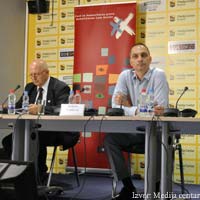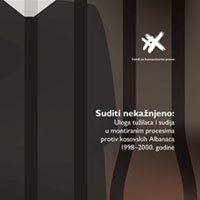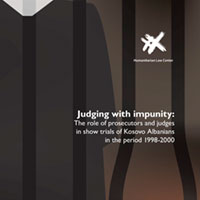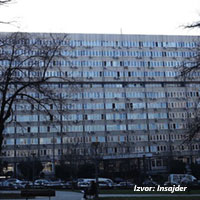(srpski) STJEPANOVIĆ: VLAST OPSTRUIŠE SUĐENJA ZA RATNE ZLOČINE

Sorry, this entry is only available in srpski.


Sorry, this entry is only available in srpski.

 There are only a few months left until the closure of the Tribunal for the former Yugoslavia. At that point, judicial cooperation between the countries of the region will become even more essential
There are only a few months left until the closure of the Tribunal for the former Yugoslavia. At that point, judicial cooperation between the countries of the region will become even more essential
Two years ago, many observers called the “Kravica case” a historic step towards justice and reconciliation in the post-Yugoslav region. Today, that process could stop, together with a long-awaited trial, stalled by procedural vices that hide heavy institutional pressure.


On Tuesday, July 25th, 2017, the Humanitarian Law Center (HLC) presented the report “Judging with impunity: The role of prosecutors and judges in show trials of Kosovo Albanians in the period 1998–2000” . The Report points to a number of violations of fundamental human rights committed during criminal proceedings against Kosovo Albanians in the period 1998-2000, before district courts in Serbia.

 On July 11 2017, the mortal remains of 71 identified victims were buried in the Srebrenica-Potočari Memorial center. The youngest victim at the time of murder was 15 years old, and the oldest 72.
On July 11 2017, the mortal remains of 71 identified victims were buried in the Srebrenica-Potočari Memorial center. The youngest victim at the time of murder was 15 years old, and the oldest 72.
Two articles published in this issue of the bulletin through ACCESSION towards JUSTICE were written by the participants at the 8th School of Transitional Justice, in memory of the 71 victims buried this year, as well as in memory of the 6504 victims buried so far, and those victims for whose mortal remains we are still looking, and in honour of the persistence of their families who have spent the last 22 years in grief and despair. The Bulletin also gives an overview of court procedures conducted before the courts in Serbia for crimes committed against Bosniak civilians during July 1995 in and around Srebrenica. Only three cases have been conducted to date, one of which ended in a guilty plea bargain; in the second, the indictment has recently been dismissed, and in the third case, the trial chamber, despite the evidence proving the opposite, avoided linking the crime which was subject to the indictment to the events happening at that time in and around Srebrenica. The Column titled “Current Events” presents the manner in which Serbia remembered victims of the Srebrenica genocide this year.
Send us your opinions and comments on the newsletter and/or the topics discussed to the e-mail address towardsJUSTICE@hlc-rdc.org. Discussion is also welcome on Twitter/#towardsJUSTICE.
Download your copy of the bulletin here.

Sorry, this entry is only available in srpski.

Sorry, this entry is only available in srpski.

 Around the end of 1996 and the beginning of 1997, the offices of district public prosecutors began indicting Kosovo Albanians en masse, pursuant to Article 125 of the CCY (with reference to terrorism) and Article 136, paragraphs 1 and 2 of the CCY (with reference to association for the purpose of conducting hostile activities). The trials for the above-cited charges were conducted by district courts in Kosovo during 1998 and 1999, more specifically until 9 June 1999 when the Kumanovo Agreement was signed and the army and police began their withdrawal from the territory of Kosovo.
Around the end of 1996 and the beginning of 1997, the offices of district public prosecutors began indicting Kosovo Albanians en masse, pursuant to Article 125 of the CCY (with reference to terrorism) and Article 136, paragraphs 1 and 2 of the CCY (with reference to association for the purpose of conducting hostile activities). The trials for the above-cited charges were conducted by district courts in Kosovo during 1998 and 1999, more specifically until 9 June 1999 when the Kumanovo Agreement was signed and the army and police began their withdrawal from the territory of Kosovo.

 More than a year after the adoption of the Action Plan for Chapter 23 (Action Plan), the provisions of this document relating to the prosecution of war crimes are being carried out superficially, for merely ”cosmetic” purposes, and many of the prescribed activities are not being carried out at all. The situation is the same when it comes to the implementation of the National Strategy for the Prosecution of War Crimes (National Strategy). It must therefore be said that the state authorities responsible for the implementation of the above provisions of the Action Plan and National Strategy are falsely informing the public about their work, and continually making it difficult for the civil society to access relevant information and monitor their work. The Humanitarian Law Center (HLC) believes that such behaviour is contrary to the obligations of the accession negotiations with the EU, and is an indicator of Serbia’s lack of commitment to the reform process, as well as sincere effort to prosecute war crimes more efficiently.
More than a year after the adoption of the Action Plan for Chapter 23 (Action Plan), the provisions of this document relating to the prosecution of war crimes are being carried out superficially, for merely ”cosmetic” purposes, and many of the prescribed activities are not being carried out at all. The situation is the same when it comes to the implementation of the National Strategy for the Prosecution of War Crimes (National Strategy). It must therefore be said that the state authorities responsible for the implementation of the above provisions of the Action Plan and National Strategy are falsely informing the public about their work, and continually making it difficult for the civil society to access relevant information and monitor their work. The Humanitarian Law Center (HLC) believes that such behaviour is contrary to the obligations of the accession negotiations with the EU, and is an indicator of Serbia’s lack of commitment to the reform process, as well as sincere effort to prosecute war crimes more efficiently.